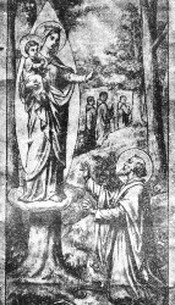
Meanwhile the Bishop of Angers died, and St. Martin, who went thither to choose a successor, took Maurilius with him. The clergy and people were assembled, and the election was about to begin, when suddenly a white dove was seen which, after having fluttered through the church for some time, at length descended upon the shoulder of St. Maurilius. All looked upon this event as a sign that God had chosen this holy man as Bishop, and hence they unanimously declared that they desired no other. He was therefore consecrated bishop by St. Martin, to the inexpressible comfort of the people, although he himself shed many tears at being obliged to accept the dignity.
As Bishop, his virtues shone still more brightly; for he had more opportunities to practise them in the world than in the convent and his exalted station imparted to them an additional lustre. He fasted with great rigor, and on three days of the week he partook only of bread and salt. He never tasted wine, and during Lent, seldom left his residence; "for," said he, "Lent is a time of solitude, during which we ought to contemplate the passion and death of Christ." He was unwearied in instructing his flock and in converting the heathen.
One day, while he was standing before the Altar to perform the holy sacrifice, a woman requested him to administer to her sick son the holy sacrament of Confirmation. Maurilius, not thinking that the lad was in danger, continued Mass, but before he had finished it, the child was dead. The holy man was exceedingly grieved at this accident, and as if having committed great sin, he sentenced himself to a severe penance. He secretly left the city, and hastened over hill and dale, until having arrived at the sea, he went on board of a ship which was setting sail for England. During the voyage, the keys of the holy relics which he had taken with him, fell into the sea, and he solemnly declared that he would not return to his diocese, until he should again possess them, which, as he believed, would never happen.
At length he arrived in England, where, without making himself known, he took service with a nobleman as gardener. It was his intention to do penance for his sin by the hard labors of this occupation during winter and summer. The inhabitants of Angers were meanwhile greatly dismayed at the disappearance of their highly esteemed bishop, and sent several persons in search of him. Seven whole years had elapsed, when, by divine revelation they found him. Their good angel guided them in such a manner, that they found their holy bishop coming from his garden with a load of vegetables for his master. They immediately recognized him, and besought him, with tears in their eyes, to return to his see, and watch over the spiritual welfare of his flock. St. Maurilius, who thought that they had long since elected another bishop, was greatly disturbed on beholding them. He could not deny his identity, but endeavored to evade their wishes by making different pretexts, and finally declared that he could not return under any circumstances, as he had solemnly vowed that he would not see Angers again until, the keys were found which had fallen out of his hand into the sea.
"If this is the only obstacle to your return, we are able to remove it," said the delegates; "for on the voyage, we caught a fish, in whose stomach we found the keys." Showing them to him, they persuaded him to regard the finding of them as an unmistakable proof that God desired his return. Maurilius made no further resistance, but taking leave of the gentleman whom he had served, he returned to his see. It must also be stated that, shortly before the arrival of the delegates, while St. Maurilius was weeping bitterly over his sins, an angel had appeared to him and given him the assurance of their entire remission, which filled his heart with inexpressible joy. It would be difficult to describe the rejoicings of the inhabitants of the entire diocese on the return of their holy bishop. The Saint, however, first went to the place where the abovementioned lad had been buried seven years before. Having said his prayers with the utmost confidence in the power of God, he awakened the child from death, as is testified by St. Gregory of Tours and others. Those present had never so clearly comprehended how pious and holy a man God had bestowed upon them in their bishop, as at the moment of that startling event. Maurilius gave the lad the name of Renatus, which means "born again," and instructed him so carefully in all that pertains to a Christian life, that he afterwards became the successor of his holy teacher.
The remainder of his life the Saint passed in his habitual austerity, and in great zeal for the salvation of souls. When he had reached his ninetieth year, God revealed to him the hour of his departure. Preparing himself with the greatest solicitude, he ordered his grave to be dug, and after a short illness, gave up his soul to his Creator. At his funeral, besides other miracles which took place, two persons who had been blind from birth received their sight, and a man who had been paralyzed thirty-one years, regained the use of his limbs, on kissing the coffin in which the relics of the Saint reposed. Well worth considering are the words which the holy man spoke shortly before his death to those around him: "Ponder well," said he, "that your souls are bought at a great price: the precious blood of Jesus Christ."




